Risks to Tunisia’s push to revive its economy remain “very high,” the International Monetary Fund warned as it signed off on a sorely needed loan instalment.
The $245mn tranche, part of a $2.9bn lifeline the IMF awarded in 2016, had been delayed as the government struggles with duelling pressures of cutting costs while meeting the demands of powerful labour unions that consistently press for pay hikes.
Tunisia’s economic reform blueprint relies on boosting taxes, paring energy subsidies and cutting other costs. “There is no room for relaxing the effort on taxes or current expenditure after the recent increase in civil service wages,” David Lipton, the IMF’s first deputy managing director and acting chairman, said in a statement.
The nation that gave rise to the 2011 Arab Spring uprisings is often hailed as the best example of democracy in the region. But nine successive governments since the ouster of president Zine El Abidine Ben Ali have struggled to revive the economy, with ills ranging from militant attacks on the vital tourism sector to political bickering and inflation that has spiked to 25-year highs.
Union demands had delayed the payment of the loan instalment for months, and the government eventually was forced to increase salaries for public sector workers. But authorities also further cut energy subsidies, raised the retirement age, and increased borrowing costs in February for the first time since mid-2018, in response to the deterioration in the country’s finances.
Taoufik Rajhi, the prime minister’s economic adviser, called the agreement a “vote of confidence” by the IMF, while noting that differences over foreign exchange policy persist. The IMF has pressed for greater exchange-rate flexibility to help boost international reserves, but a weakening of the dinar could fuel inflation.
“Stabilising the exchange rate is a matter of structural policy rather than a cyclical regulation,” Rajhi said.
The Tunisian dinar has fallen by about 37% against the euro since September 2016, according to Bloomberg calculations, though it has appreciated slightly since the start of 2019.
“Reducing external imbalances hinges on a market-determined exchange rate,” Lipton said. “Competitive FX auctions together with reduced Central Bank interventions and effective communication to the market remain critical to improve the current account and reserves cover.”

A man fills a vehicle with gasoline in Ben Guerdane, near the Libyan border in Tunisia on May 26. Tunisia’s economic reform blueprint relies on boosting taxes, paring energy subsidies and cutting other costs.
